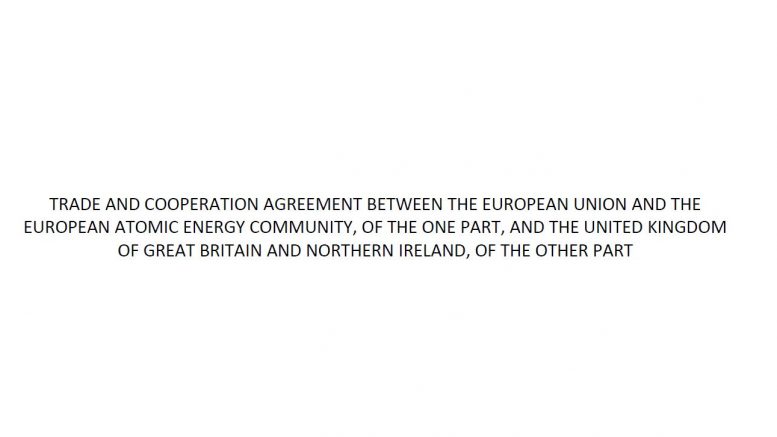It is not the end of Brexit, but with the newly expressed amity and partnership between the two parties, it may be the end of the beginning, writes John Egan
It is a great illusion, but the idea that sovereign people are free to plot their way in the world and boldly go, like hobbits, towards a brighter future could not stand the heat of the Brexit negotiations.
Any economic rationale behind the agreement has been superseded by its political objectives – on both sides of the channel. But what relief there is that goods can still move around Europe, albeit with the extra paperwork in customs declarations and regulatory certifications.
The two other pillars of the European internal market – services and citizens – have been left behind, rather like the non-essential furniture of someone who has been forced to quickly downsize. They have to be left in storage and dealt with later.
Services contribute 80 per cent of the total United Kingdom gross domestic product. Financial services alone contribute 7 per cent and provide 1.1 million jobs. Compare this with the 0.1 per cent and 12,000 jobs associated with the fishing industry for which there is a deal, albeit not one that leaves the industry happy.
Personal freedoms have been curtailed too. Accountants and architects among many service providers have seen their qualifications devalued and can no longer practice across mainland Europe and vice-versa in the UK. Britons can enjoy their second continental home for up to 90 days before they must return home. They all lose rights of access to healthcare in Europe that was a benefit of being European.
The deal is done. pic.twitter.com/zzhvxOSeWz
— Boris Johnson (@BorisJohnson) December 24, 2020
Yesterday, the UK Prime Minister, Boris Johnson, told the Sunday Telegraph that the post-Brexit trade deal “perhaps does not go as far as we would like” on financial services. “Politics over pragmatism” is how Catherine McGuinness, policy committee chairwoman at the City of London Corporation, described the outcome in The Times.
The list of those services and people left behind by the Brexit trade deal points clearly to politics in the ascendency.
The “Red Wall” voters in previously Labour-held constituencies in the north of England captured by the allure of Boris Johnson’s mantra to “Get Brexit Done” so that Britain could move forward to a “Golden New Era”, need to see a return for their new-found allegiance.
It is a seductive proposition, particularly for those regions left behind by a decade of Tory austerity. These are the people who see the financial sector as a root cause of their neglect and feel cheated by the rapid restoration of the international system of finance and commerce in which they have no stake.
The same division and discontent can be seen across the developed world. And it is here that Britain’s global ambition risks becoming unstuck. Nationalist politics is a two-way street.
While the UK political prerogative is epitomised by the renationalisation of British fish as an ideological totem for the restoration of sovereignty, the final agreement has diluted those goals and British fishermen who had been promised so much are angry, dubbing it as “caving in” after fishing was sacrificed for other national objectives.
On the other hand, French fishermen are relieved.
With the presidential election coming up in 2022 there was little chance that Emmanuel Macron was going to hand to his likely contender, right-wing nationalist Marine Le Pen, the French coastal communities.
In numerous articles published since the 2016 referendum on Chief-Exec.com, we have pointed to the inevitable dilution of sovereignty that accompanies all international trade treaties, including those based on World Trade Organization rules.
Much of this inevitable compromise is embedded in Investor-State Dispute Settlement (ISDS) provisions. In the agreed post-Brexit trade treaty, 222 references to the “arbitration tribunal” show that ISDS is alive and well in this newly minted treaty and trade will be dependent on compliance with tribunal judgements.
Democracy, rule of law and human rights are also listed as “essential elements” within the 1200-plus pages of Mr Johnson’s agreement, including formally upholding the provisions of the European Convention on Human Rights. If there is considered to be a serious and substantial failure to fulfil those essential elements, either the UK or the EU may decide to terminate or suspend the operation of the agreement in whole or in part. Little has yet been written on this important clause.
The UK remains a trusted partner. We will stand shoulder to shoulder to deliver on our common global goals.
But now let’s turn the page and look to the future.
To all Europeans I say: it is time to leave Brexit behind.
Our future is made in Europe. pic.twitter.com/QefWjB5KdH
— Ursula von der Leyen (@vonderleyen) December 24, 2020
There is jubilation in the UK and relief in the EU that a deal has been done and that the inevitable economic damage has been minimised. But this is at the expense of leaving the hard subjects behind. Those – such as European access for financial services through passporting or equivalence provisions – will need to be dealt with because their scale means they cannot remain unresolved.
It is not the end of Brexit, but with the newly expressed amity and partnership between the two parties, it may be the end of the beginning.

Headline Photo Credit: Coverpage of EU-UK post-Brexit trade treaty




